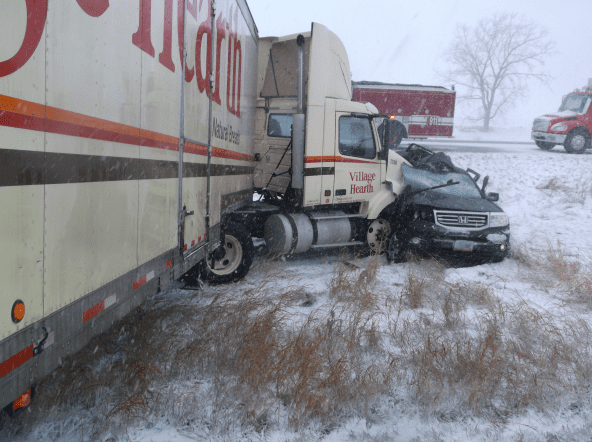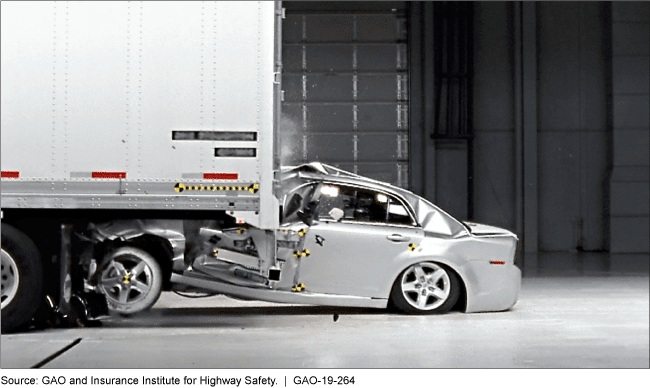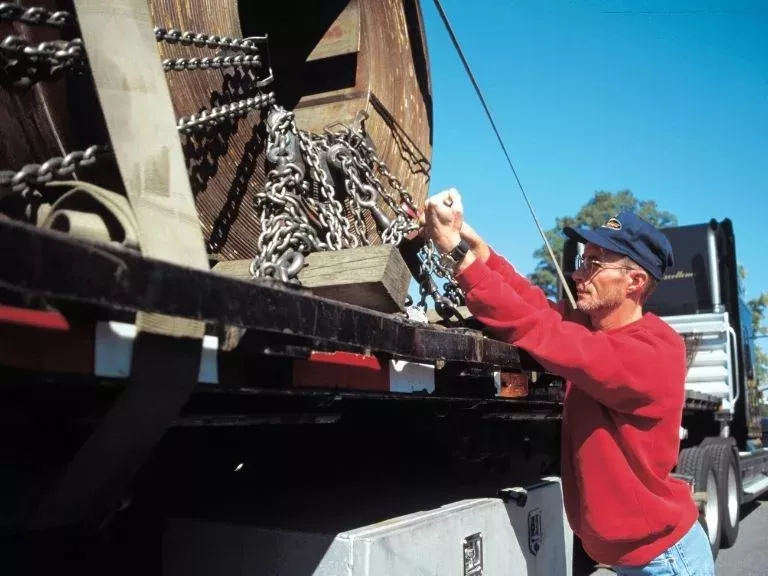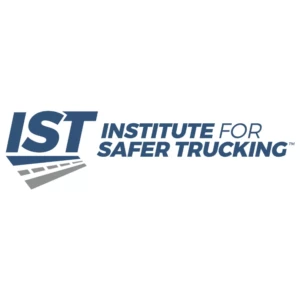
Automatic Emergency Braking (AEB)
Automatic Emergency Braking (AEB) systems use technology to measure the distance between a truck and the vehicle ahead of it, applying the brakes automatically, if it is determined continued speed would result in a truck crash.
AEB systems measure the distance between a truck and the vehicle in front, applying brakes automatically to prevent a potential truck crash caused by excessive speed.
What Is Automatic Emergency Braking and How Does It Work for Trucks?
What Is Automatic Emergency Braking?
An Automatic Emergency Braking (AEB) system is a computerized system used to reduce truck accidents. It uses techniques such as cameras and radar to measure the distance between a truck and the vehicle ahead of it. By keeping track of the velocity of the truck and the vehicle ahead of it, the AEB system detects when a crash is imminent and will apply the brakes automatically.
AEB is often combined with a forward collision warning (FCW) technology, a system that determines the likelihood of a collision at any given moment and warns the driver of the impending collision. When these two technologies are used together, they create what is know as a a Forward Collision-Avoidance Mitigation (FCAM) system, which has tremendous potential to prevent countless rear-end truck accidents, saving lives.
An Automatic Emergency Braking (AEB) system is a computerized technology that uses cameras and radar to detect the distance between a truck and the vehicle ahead. It can apply the brakes automatically when it detects an imminent collision. Combining AEB with forward collision warning (FCW) creates a Forward Collision-Avoidance Mitigation (FCAM) system, which can prevent many rear-end truck accidents and save lives.
Referrals & Co-Counsel
Involved in a Crash?
No other law firm knows trucks quite like us. Our trucking law expertise and trial experience allow us to win multi-million-dollar results year after year.
Our team of truck accident attorneys works tirelessly to help your family find justice in the wake of a catastrophic truck crash.
Referrals & Co-Counsel
No other law firm knows trucks quite like us. Our trucking law expertise and trial experience allow us to win multi-million-dollar results year after year.
Involved in a Crash?
Our team of truck accident attorneys works tirelessly to help your family find justice in the wake of a catastrophic truck crash.
Automatic Emergency Braking Effectiveness & Statistics
Tractor-trailers cause a disturbing (and increasing) number of truck crashes yearly. Enhancing truck safety is one of the most effective ways of reducing tragic traffic accidents and deaths. Studies indicate that recent innovations in truck safety systems can drastically reduce the incidents of certain kinds of truck crashes.
One recent study conducted by the Insurance Institute for Highway Safety (IIHC) concurs. The IIHS study concluded that the installation of AEB and FCW can significantly reduce rear-end truck accidents by 40%.
Another study involving more than 12,500 trucks over several years concluded that collision avoidance systems would prevent the following number of crashes and deaths every year:
- Air disc brakes: Over 2,000 crashes and over 35 deaths.
- Automatic emergency braking statistics: Over 5,000 crashes and 50 deaths.
- Lane departure warning systems: Over 6,000 crashes and over 100 deaths.
- Video-based onboard safety monitoring: Over 60,000 crashes and nearly 300 deaths.
What’s most notable about these studies is that these live-saving solutions are economically feasible.
The Benefit to Large Commercial Vehicles
The National Highway Traffic Safety Administration (NHTSA), along with the Virginia Tech Transportation Institute, completed a year-long test of trucks equipped with collision avoidance systems.
The test was a success and involved 150 trucks, more than 100 drivers from 7 unidentified motor carriers traveling and producing 3 million miles of data, with no rear-end crashes. NHTSA reported that fleet safety managers should recommend crash avoidance system technology with new fleet acquisitions.
Trucks with automatic emergency braking systems can save lives because semi-trucks, which can weigh 30 times as much as a passenger vehicle, suffer from longer stopping distances, wide blind spots, and more devastating impacts. Other crash avoidance systems, including systems still in the R&D stage, offer great promise for the future.
The test was a success and involved 150 trucks, more than 100 drivers from 7 unidentified motor carriers traveling and producing 3 million miles of data, with no rear-end crashes. NHTSA reported that fleet safety managers should recommend crash avoidance system technology with new fleet acquisitions.
Trucks with automatic emergency braking systems can save lives because semi-trucks, which can weigh 30 times as much as a passenger vehicle, suffer from longer stopping distances, wide blind spots, and more devastating impacts. Other crash avoidance systems, including systems still in the R&D stage, offer great promise for the future.
Passing Life-Saving Legislation: Automatic Emergency Braking Systems Laws & Regulations
In July 2019 the Safe Roads Act was introduced into both the House and the Senate. This bill would:
- Require the manufacturers of new commercial motor vehicles to install automatic emergency braking systems;
- Establish performance requirements for such braking systems; and
- Require such systems to be used while the commercial vehicles are in operation.
Meanwhile, the National Highway Traffic Safety Administration (NHTSA) has already announced that it will set nationwide AEB standards for big rig trucks over the next few years.
The Infrastructure Investment and Jobs Act requires AEB on new heavy trucks in Class 7-8 by November 2023. So far, legal requirements exclude over 500,000 trucks in Classes 3 to 6 every year. Even so, your odds of becoming the victim of a truck accident are likely to decline.

Crash. Not Accident.
The word “accident” is often used to describe devastating truck crashes. Many people in need of legal help will search for a “truck accident lawyer near me” or the “best truck accident attorney”. We even use "accident" in our site name.
However, most truck “accidents” are not accidents at all.
Truck crashes are often caused by distracted, fatigued, poorly trained, or downright dangerous truck drivers and/or the unsafe business practices of the trucking companies and brokers that hired them. Every semi-truck accident lawyer at The Law Firm for Truck Safety is committed to helping those who have been irreparably harmed in commercial vehicle crashes and providing education to the public that crashes are not accidents.
We Are Safety Advocates
Our lawyers are tireless safety educators and advocates.
Public awareness and education play a large role in effecting meaningful change when it comes to truck safety regulation and reform.
In our effort to create safer roads, safer commercial vehicles, and reduce serious trucking injuries and fatalities to zero, we partner with and proudly support the following non-profit highway safety organizations:
Public awareness and education play a large role in effecting meaningful change when it comes to truck safety regulation and reform.
In our effort to create safer roads, safer commercial vehicles, and reduce serious trucking injuries and fatalities to zero, we partner with and proudly support the following non-profit highway safety organizations:
Explore More Life-Saving Truck Safety Initiatives









Involved in a Truck Crash?
Use Your Story to Make a Difference
Use Your Story to Make a Difference
In the fight to create safer roads, the most powerful tool you have is your voice. If you or a loved one have been involved in a rear-end semi-crash, we invite you to share your story with us.
Together, we will work to hold accountable the responsible truck driver and truck company for the ways they hurt you and your family. With your courage and our resources, we can champion your story, using it to protect countless others from enduring a similar experience.
Let's take the next step together on the road to safer roads.
CALL TODAY: 1-800-628-4500










